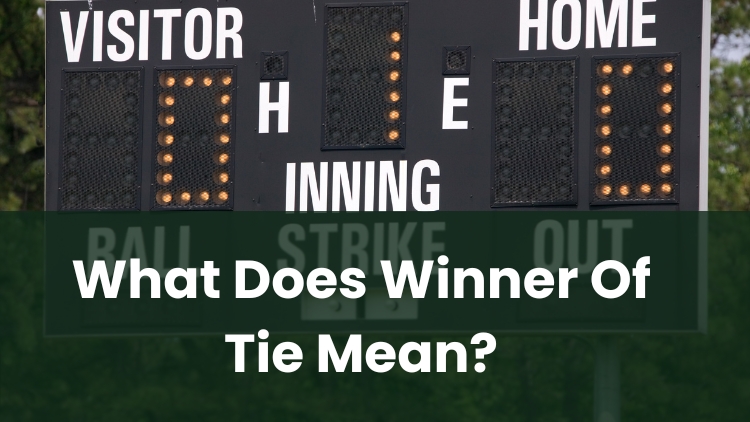
Have you ever heard the term "winner of tie" and wondered what it means? It might seem puzzling at first, especially if you’re new to it. This phrase often pops up in gaming and sports, and understanding it can help you follow the outcome of many competitions more clearly.
Often, a tie happens when two players or teams finish with the same score. But what happens next? Many games and sports have rules for what to do when a tie happens. These rules decide who wins in a fair and clear way.
In this blog post, we’ll explore what "winner of tie" means, why it’s important, and how different games handle ties. If you're ready to learn more and clear up any confusion, keep reading.
Winner Of Tie Meaning
The phrase "winner of tie" refers to the process of deciding who wins in a game or competition when the participants end with the same score. This isn't just limited to sports; it can also apply to board games, card games, and even some quizzes or lotteries.
In many cases, specific rules are set out to determine the winner in the event of a tie. These rules ensure fairness and clarity. For example, in football, extra time or a penalty shootout might be used to decide the winner.
Games often have their own unique ways to handle ties. For instance, in some card games, a secondary factor like a card’s suit or a bonus round might come into play. This helps clear up who takes home the win.
Tie In Football Betting: What Happens?
When it comes to football betting, ties can be an important aspect to consider. A tie in football occurs when both teams finish the match with the same score. This is also known as a draw.
In football betting, one common type of bet is the "Win-Draw-Win" bet. Here, you can place a bet on Team A to win, Team B to win, or the match to end in a draw. If you bet on a draw and the match ends with both teams having the same score, your bet would be a winning one.
There is also the "Draw No Bet" option. This means if the match ends in a draw, your stake is returned to you, essentially cancelling the bet. This type of bet is helpful if you want a bit more security but are leaning towards one team winning.
Knowing what happens in the event of a tie helps to understand the betting outcome. It ensures that you are prepared for different results and can adjust your betting strategy accordingly.
Does a Tie Mean a Loss In Sports Betting?
In sports betting, a match ending in a tie can lead to different outcomes, but it doesn't always mean a loss for the bettor - the result depends on the kind of bet you've placed.
For bets specifically predicting a win or loss, a tie might mean the bet is lost. However, if you bet on the match ending in a draw, a tie would result in a win.
Some bets are known as “draw no bet” wagers. With these, if the match ends in a tie, the bet is voided, which means you receive your stake back.
It's important to know the terms and conditions related to your wager. This helps you understand what a tie would mean for your specific bet; reading the rules for each type of bet provides a clearer picture of how ties affect betting outcomes.
*The information provided in this blog is intended for educational purposes and should not be construed as betting advice or a guarantee of success. Always gamble responsibly.
